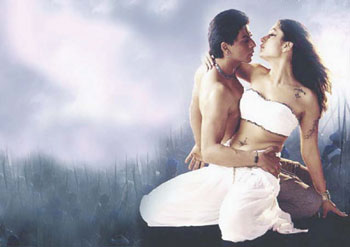![[Metroactive Movies]](/gifs/movies468.gif)
[ Movies Index | Show Times | Santa Cruz | Metroactive Home | Archives ]
Pacific Rim Film Festival
Critic's Pick:
India, 2001
Time to get your paisa vasool (money's worth) from this two-hour-and-49-minute Bollywood epic adventure. Asoka is loosely based on the life of Chandragupta Maurya's grandson, King Asoka, the bloodthirsty ruler of Magadha who famously renounced violence and turned to Buddhism, spreading its wisdom across his lands. Or at least that's the way Buddhist lore tells the story.
Being a Bollywood flick, Asoka is directed by Santosh Sivan with song and dance numbers, lavish costumes, choreographed fight scenes, a four-way love triangle, a melodramatic historical plot and a warring cast of thousands.
Asoka begins with the legendary moment when emperor Chandragupta Maurya throws down his sword to become a Jain ascetic, warning his grandson that the weapon is a demon and only wants blood. A few stylishly dramatic shots later, the young Asoka recovers the sword and promptly (albeit accidentally) kills his pet birds with it. Asoka looks on in horror as a lone, bloody feather floats to the ground. As is often the case, Asoka's life story is used here to impart the lesson that anger destroys everything.
"This film does not claim to be a complete historical account of Asoka's life," reads the preface to the film. "It is an attempt to follow his journey."
The journey herein emphasized is one from innocence to bloodlust and coveting the throne. But like the Buddha before him, Asoka exiles himself to living among the common people and finds loving redemption then heartbroken corruption, which leads to even more bloodlust and back to love and wisdom. Dizzy yet? Wait till you see the musical bits.
As with most historical fiction, revealing the epilogue can't really be considered a "spoiler" since anyone familiar with the legend already knows what happens: After a life spent mired in royal intrigue, love quadrangles and brutal military conquests, Asoka opted out, choosing instead to pursue moral and spiritual conquests. He erected monuments at significant Buddhist sites and sent missionaries (including his two children) as far as Kashmir, Persia and Ceylon. He erected stone pillars inscribed with the 14 Edicts of Asoka, which focused on nonviolence and what some non-Buddhist scholars describe as a sort of panreligious interpretation of dharma.
"Less than fifty years after Asoka's reign, the Magadha Empire collapsed," reads the epilogue ... , proving once and for all that a great offence really is the best defense? No, no, the fate of the Magadha Empire is not the point. As the epilogue concludes, "What continues to endure is his immortal humanistic ideology." (Mike Connor)
[ Santa Cruz | Metroactive Central | Archives ]
Copyright © 2005 Metro Publishing Inc. Maintained by Boulevards New Media.
For more information about Santa Cruz, visit santacruz.com.
![]()

'Asoka'
Del Mar Theatre, Oct. 8, 7pm; Oct. 10, 12:30pm
From the October 5-12, 2005 issue of Metro Santa Cruz.